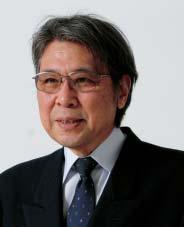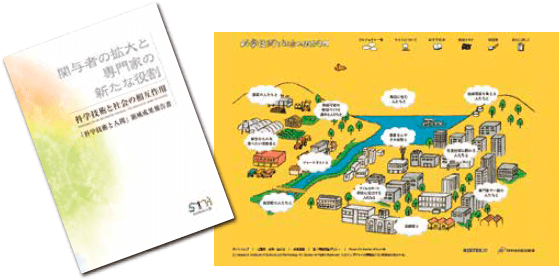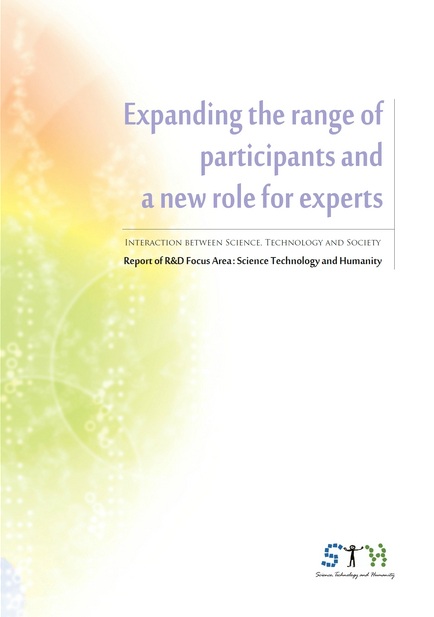Over an eight-year period, from FY2005 to FY2012, we were engaged in two R&D programs in the R&D Focus Area Science Technology and Humanity that relate to issues involving science, technology and society, namely "Science and Technology, Literacy in the 21st Century" (FY2005 to FY2009) and "Interaction between Science, Technology and Society." (Activities ended in March 2013)
Program Supervisor

MURAKAMI Yoichiro
President, Toyo Eiwa University(as of the completion of the R&D Focus Area)
Of all the types of knowledge, the power of knowledge based on Science and Technology has been unsurpassed. As a result the environment around us is now full of artifacts, which both support and restrict human activity. Our lives, from cradle to grave, are now dominated almost completely by artificial mechanisms. In other words, many matters that were dominated by nature are coming to be dominated by the will of human beings. Despite this drastic change, there has been little appropriate innovation in human activities and behavior, or the codes of conduct and social systems that prescribe human activity compared to the times when these matters were dominated by nature.
This Focus Area aims to study the nature of human beings, lifestyles and society in the future, as science and technology continue to play an ever greater role in society. The study will be conducted from an empirical as opposed to an armchair approach.
Goals
- To create an open network of people involved in dealing with problems that arise between S&T and society, not only drawing from universities and research institutions but also from political, industrial, legal, administrative and other societal sectors.
- To assess how and what has changed and what issues have arisen as the result of the interactions of S&T with society, and to produce solid outcomes (i.e., policy proposals, development of methods, system innovations and experimental exercises) which can be implemented in society.
Summary of R&D Focus Area outcomes and recommendations
The achievements of science and technology now have a large influence daily life, being widely utilized throughout society. 'Trans-science' defines fields where scientific questions can be raised, but science cannot provide a full answer on its own. In order to resolve trans-scientific issues, they must be considered by the various relevant parties affected
by the issues, not just researchers.
All 12 projects in this program address a variety of trans-scientific issues including nanotechnology, ICT, medicine, food safety, and global environment. Based upon the results of those 12 projects, we can summarize this program's outcome and recommendations as follows.
1. Making the Connection Between Science and Technology and Everyday Life
Given the rising complexity and uncertainty in science, technology and society, it is important to involve more concerned people, and link expert knowledge on science and technology with "common sense = knowledge in life" in local environments, to ensure our decisions are more effective and open.
2. Encouraging Experts to Take a Step Forward
There is a need for experts who are able to collaborate with a variety of people by finding solutions to complex and uncertain issues, not staying in their area of expertise but rather taking a small step forward while duly keeping the limitation of their discipline in mind.
3. Learning from Pilot Projects on Social Challenges
It is necessary to carry out various pilot projects to address social challenges, in particular, we should constantly provide spaces for collaboration between these new experts who have taken a step forward and diverse stakeholders, as well as anyone concerned with practical issues in our society. We need to embark on social challenges, with a longterm perspective so that we can keep learning from our experiences, including possible failures.
4. Building up Trust Through Continuous Response
Especially following the 2011 Great East Japan Earthquake (earthquake, tsunami, and nuclear accident.), success of social challenges largely depends on how trust is created. Trust is never obtained solely from expert knowledge. Taking into account the complexity and uncertainty associated with social issues, continuous dialogue among a wide range of stakeholders and those people concerned is essential.
The outcomes are disclosed in the report and on the website.
You can see, in detail, the outcomes of the R&D program "Interaction between Science, Technology and Society" in the report as well as on the program websit. The report "Augmentation of Stakeholders and New Roles of Experts" is available for downloading from the website (in Japanese/English).

REPORT of R&D Focus Area
Report of R&D Focus Area: Science Technology and Humanity
INTERACTION BETWEEN SCIENCE, TECHNOLOGY AND SOCIETY
"Expanding the range of participants and a new role for experts"
R&D Projects
R&D Program: Science and Technology, Literacy in the 21st Century (FY2005-2009)
To fund and support R&D projects (of 1-5yrs. in duration) to pursue Goals [1] and [2]
|
A Study for Public Understanding and Response to Climate Change Issues |
2005.12-2008.11 |
|---|---|
|
Expanding Literacy for Citizen-based Nature Revitalization and Local Community Revitalization Using Satellite Image Information |
2005.12-2008.11 |
|
A Study of Basic Terminology as Citizen's Science and Technology Literacy |
2005.12-2008.11 |
|
Basic Research for Improving and Maintaining the Science and Technology Literacy of Citizens |
2005.12-2008.3 |
|
The Formation of Citizen Patronage for Science |
2005.12-2008.11 |
|
Interactive Enhancement of Researchers' Social Literacy and Laypeople's Science Literacy |
2005.12-2008.11 |
|
Improvement of Science and Technology Literacy Among Young Generations by Researchers Engaged in Cutting-edge Technology |
2006.12-2009.11 |
|
Learning Science for Science Learning |
2006.12-2009.11 |
|
Scientific literacy surveys to identify various literacy characteristics within the public, and development of educational programmes matched to those characteristics |
2006.12-2009.11 |
|
Enhancing Neuroscience Literacy through the Use of a Textbook Designed for both Humanities and Science Students |
2006.12-2009.11 |
R&D Program: Interaction between Science, Technology and Society (FY2007-2012)
To fund and support R&D programs that deal particularly with S&T literacy issues, including the improvement of S&T literary among non-experts and social literacy of S&T experts
FY2009
|
Remodeling Interactive Risk Communication based on Actor' s Spontaneous Cooperation (RIRiC) |
2009.10-2012.9 |
|---|---|
|
Autism-friendly Society : A Search for Reconciling Coexistence with and Cure of Autism |
2009.10-2012.9 |
|
Establishment of the "Science Media Centre of Japan" as an Information Hub for Science and Technology |
2009.10-2012.9 |
|
Legal Decision-making under Scientific Uncertainty |
2009.10-2012.9 |
FY2008
|
Construction of a Pragmatic Scientist Community Contributing to the Stakeholder-driven Management of the Local Environment |
2008.10-2012.9 |
|---|---|
|
Promotion of Dialogue for Policy Making: Case of the Long-term Significant Reduction in Green House Gases Emissions |
2008.10-2012.3 |
|
Establishment of the Social System for the Healthy Coastal Sea Environment (Creation of "Sato-umi") |
2008.10-2012.9 |
|
Development of Medical Care Based on Convinced Validities from Multiple Viewpoints - Clinical Assessment through Integrated Application of Ubiquitous Vision and Conversation Analysis in a field of Tertiary Acute Care - |
2007.10-2012.3 |
FY2007
|
The Nagahama Rules for Genome Epidemiology Studies Open to the Community |
2007.10-2012.9 |
|---|---|
|
Innovation and Institutionalization of Technology Assessment in Japan: Dealing with Nanotechnologies |
2007.10-2011.3 |
|
Development of a Sustainable Community Management System Introducing Energy Conversion Technology for Forest Resources |
2007.10-2011.3 |
|
Research Project on the Deliberation and Cooperation between Citizens and Scientists (DeCoCiS) |
2007.10-2012.3 |
